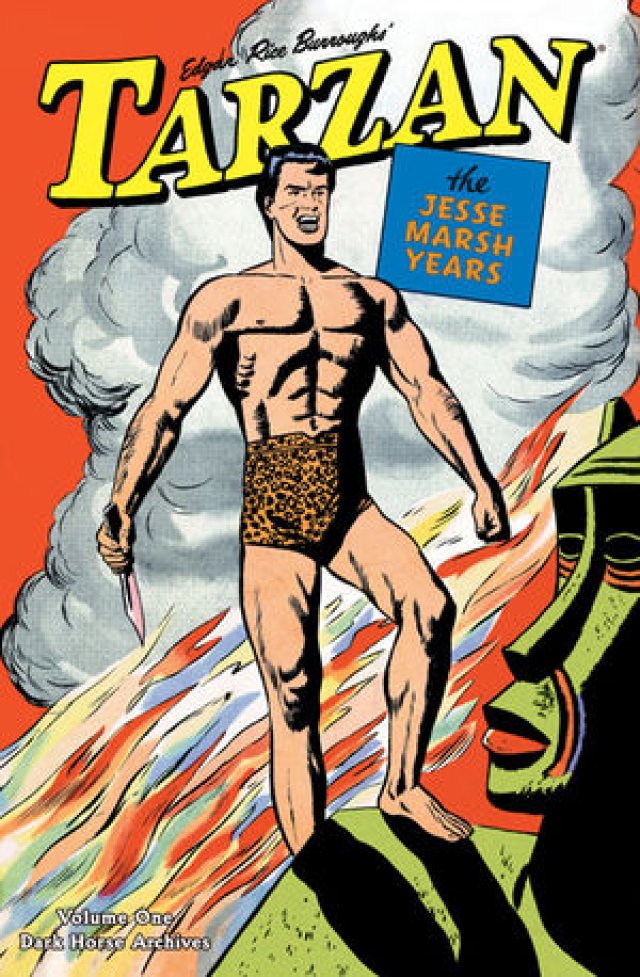
Edgar Rice Burroughs & Tarzan: A Biography
By Robert W. Fenton
McFarland & Co., 2010,
212 pages, $49.95 (pb)
Edgar Rice Burroughs was in illustrious company when his Tarzan books joined the works of Einstein, Freud, Marx, Zola, Upton Sinclair, H. G. Wells and Jack London in the Nazi book-burning bonfire in front of the University of Berlin in 1933, writes Robert Fenton in his biography of the US author.
Burroughs, though not one-tenth the writer or thinker of his fellow bonfire victims, had infringed Nazi philosophy. He did this not only by doing over the Germans of World War I in an early Tarzan book, but by having it done by a man who, though white, was barely above the status of the jungle's black Africans.
For the Nazi “super-race”, an “ape-man” besting the Germans in battle outweighed what might otherwise have been the redeeming white supremacism of Burroughs’ Tarzan books.
In Burroughs’ colonial imagination (he never set foot in Africa), black Africans are brutish savages. Their defeats by Tarzan are inscribed in Tarzan’s tree-hut plaque: “This is the house of Tarzan, the killer of beasts and many black men.”
Tarzan is a symbol of the white man’s conquest of Africa, set during the heyday of European colonialism, especially British.
“Never once,” writes Fenton, “did Burroughs waver from his conviction that the English were the height of aristocracy.”
John Clayton, the son of Lord and Lady Greystoke who were abandoned by mutineers on the African coast, was raised as Tarzan by an ape-mother. He nonetheless remained the rightful heir of his father’s House of Lords seat.
Despite his loincloth and primitive ape-English, Tarzan bears the “hallmark of aristocratic birth, the natural outcropping of many generations of fine breeding”. Such breeding was forged and tested in the British empire’s wars (“the noblest monument of historic achievement upon a thousand victorious battlefields”, editorialises an enthusiastic Burroughs in one Tarzan story).
Burroughs, born in 1875 in Chicago, was a political conservative and a fanatical opponent of the labour and socialist movements. These sentiments are shared by Fenton, his biographer and admirer-in-chief.
The 540-acre property-owning Burroughs uses one Tarzan story to whine that “to be poor assures one of an easier life than being rich, for the poor have no tax to pay”.

Not surprisingly, among Tarzan’s regular arch-enemies were a couple of Bolsheviks (Rokoff and Paulovitch) and sundry “international communists” — whose essential cowardice and lack of muscularity is no match for Tarzan and US government agents.
Sexism completes Burroughs’ supremacist trinity (white over black, capitalism over socialism, and male over female).
Swinging on jungle vines or fighting lions is Tarzan’s preserve, not Jane’s, for whom marriage and a legally-constituted family is all.
Burroughs rams home the message in Tarzan and the Ant-Men. Tarzan teaches the subjugated men of a tribe taken over by their women to exert their “natural” male superiority. And so a Tarzan-instructed tribesman takes a woman and says “he is going to keep her to cook for him”, knocks her down with his spear-shaft when she refuses, and kicks her in the ribs “to show her he meant business”.
This elicits her “doglike adulation and devotion”. “‘You will cook for me!’, he demanded again. ‘Forever!’, she replied.”
Intellectually poor fare, Burroughs’ Tarzan books nevertheless became immensely successful classics of popular fiction, cinema and television. They are well-crafted adventure stories with a popular thematic core.
Men “are all alike”, Burroughs expounds. They are “cheating, murdering, lying, fighting and for all things that the beasts of the jungle would not deign to possess”.
In civilised man, there is nothing but “deceit, and hypocrisy, and greed, and avarice, and cruelty” compared with the “freedom and happiness of the jungle”.
These sentiments — that much is primitive and ugly beneath the civilised surface of our society — are at the heart of Tarzan’s cultural success. It resonated with a widespread dissatisfaction with the social restrictions, the nasty scramble for wealth, the dishonesty and violence of modern civilisation.
Although his social critique comes from a flag-waving, war-loving, Republican-voting millionaire, Burroughs successfully taps into the myth of the “noble savage” as symbol of a morally cleaner world.
Tarzan, however, is not harmless fun. “Me Tarzan, me white man, me king of the jungle” is a philosophy that excludes those whose skin colour, gender or class status are “inferior” to Tarzan’s.
Comments
Anonymous replied on Permalink
Anonymous replied on Permalink
Anonymous replied on Permalink
Anonymous replied on Permalink